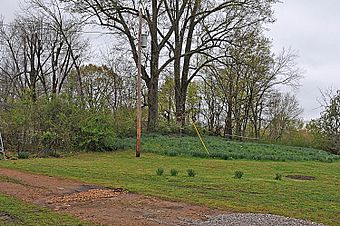Davis' Mills Battle Site facts for kids
Quick facts for kids |
|
|
Davis' Mills Battle Site
|
|

Indian mound on the battlefield
|
|
| Location | Off MS 7, Michigan City, Mississippi |
|---|---|
| Area | 16 acres (6.5 ha) |
| Built | 1862 |
| NRHP reference No. | 73001002 |
| Added to NRHP | October 2, 1973 |
The Davis' Mills Battle Site is a historic place in Mississippi where an important battle happened during the American Civil War. This battle took place on December 21, 1862. Today, you can find this site near Michigan City, Mississippi. It was added to the National Register of Historic Places in 1973 because of its historical importance.
Contents
A Civil War Clash at Davis' Mills
The Battle of Davis' Mills was a part of the American Civil War, which happened from 1861 to 1865. This war was fought between the Northern states (the Union or Federal Army) and the Southern states (the Confederate Army).
Why Was Davis' Mills Important?
Davis' Mills was a small settlement with a few key features. It had a flour mill and a saw mill. These mills were important for making supplies like food and lumber. The settlement was also located on the north bank of the Wolf River.
A wooden trestle (a type of bridge) for the Mississippi Central Railroad crossed the river nearby. Controlling this railroad was very important during the war. It allowed armies to move soldiers and supplies quickly.
The Battle Unfolds
On December 21, 1862, Confederate cavalry (soldiers who fight on horseback) attacked the Federal (Union) soldiers stationed at Davis' Mills. The Confederate forces were led by Major General Earl Van Dorn.
The Federal soldiers used an old Indian mound (a hill built by ancient Native Americans) as a strong defensive position. This mound helped them protect the area. The battle was a fierce fight for control of the mills and the railroad bridge.
Lasting Marks of History
The Davis' Mills Battle Site covers about 16 acres. It holds many memories of the soldiers who fought there. One interesting detail is a tree on the site. Soldiers carved their names, dates, initials, and even their regiment (their army unit) into its bark. These carvings are like a message from the past, showing us where these soldiers were during the war.
The site was recognized for its historical value on October 2, 1973. It helps us remember the events and sacrifices of the American Civil War.
 | Frances Mary Albrier |
 | Whitney Young |
 | Muhammad Ali |



